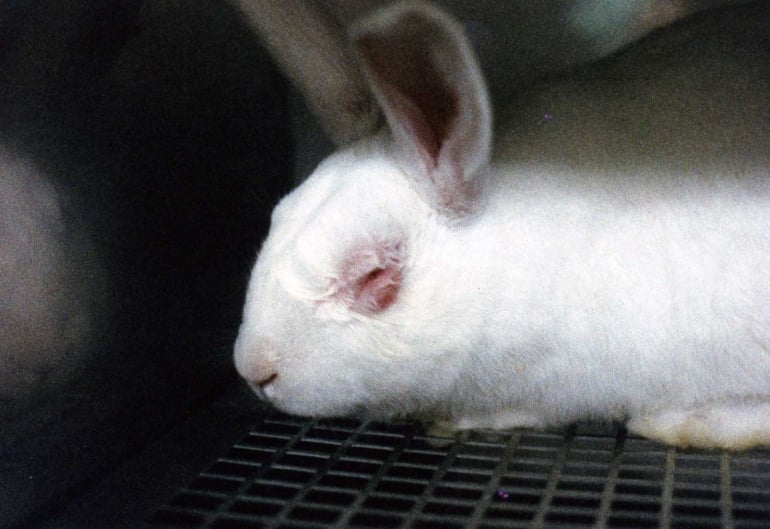EU Chemicals Regulation Is Responsible for Lethal Animal Tests – but You Can Help Us Call for Change
The European Union’s Registration, Evaluation, Authorisation and Restriction of Chemicals regulation (REACH) is the largest animal-testing programme in the world.

As of 2013, more than 800,000 animals had already been used in painful and lethal tests – and millions more are expected to be used in the coming years. The regulation is clear: testing on animals must be avoided whenever possible. But that often doesn’t happen.
For years, PETA has challenged the European Chemicals Agency (ECHA) – the body responsible for overseeing REACH – that it’s not doing enough to ensure that companies avoid testing on animals when other options are available. This means that thousands of animals are dying in painful and potentially avoidable experiments.
Here’s a timeline of the developments so far:
2009: PETA Demands End to Duplicative Testing
When we found out that REACH required duplicative tests on animals, we initiated a joint letter to ECHA with other animal-protection groups explaining how redundant tests could be avoided. ECHA was quick to take our advice on board, publishing guidance that would potentially spare the lives of 4.5 million animals.
2011–2014: European Ombudsman Complaint Is Filed
In 2011, PETA learned that tens of thousands of animals were being poisoned and killed in potentially avoidable tests. We immediately and repeatedly contacted ECHA about this unconscionable use of animals, yet the agency continued to shirk its duty to ensure that animal testing be minimised. In 2012, we took our concerns to the European Ombudsman, who determined, at the end of 2014, that ECHA hadn’t been fully exercising its authority to minimise animal experiments, as required by law. If the body had accepted its responsibilities and implemented the Ombudsman’s advice, it should have been able to limit the death toll, at the very least.
2015: PETA Calls for Enforcement Action
After learning that ECHA had been procrastinating over implementing the Ombudsman’s recommendations and continuing to allow animals to die in experiments that could have been avoided, more than 24,000 supporters of PETA France, PETA Germany, PETA Netherlands, and PETA UK signed an open letter demanding an end to this rising death toll. This grabbed ECHA’s attention and prompted a public promise that it would do more to reduce tests on animals.
2015: Precedent-Setting Board of Appeal Case Demonstrates that ECHA Prioritised Arbitrary Deadlines Over Animals’ Lives
ECHA requested that a company conduct a test for REACH which would have involved force-feeding a chemical to approximately 1,300 animals during pregnancy or as newborns before killing and dissecting them. Disgracefully, because of a self-imposed deadline, ECHA refused to consider new information which demonstrated that the deadly test could be avoided. The PETA International Science Consortium Ltd joined the company in appealing this demand, which was reversed. Furthermore, ECHA was required to change its excessively strict administrative processes to ensure that all information can be assessed before tests on animals are performed.
2016: Ombudsman Launches Enquiry into Cosmetics Testing on Animals
Using REACH as their justification, the European Commission and ECHA decided that they would permit tests on animals under certain circumstances for chemicals used in cosmetics. This shameful move violated both the cosmetics animal testing ban and REACH itself. PETA filed another complaint, and the Ombudsman launched an investigation into our claims that the Commission and ECHA are attempting to weaken the ban on testing cosmetics ingredients on animals. The case is ongoing.
2016: ECHA Promises to Focus on Alternatives to Animal Testing
Following sustained efforts by PETA, our international affiliates, and the PETA International Science Consortium Ltd, ECHA finally put a spotlight on non-animal testing methods, stating that it would prioritise the promotion of non-animal methods. But we need to make sure that they practise what they preach.
2017: Time for Europe to Lead the Way in Animal-Free Tests
With the European Commission’s upcoming formal evaluation of REACH due by October 2017, PETA’s letter, signed by more than 100,000 compassionate people, has now been submitted. Thank you to everyone who took action to demand that Europe lead the world in progressive and innovative science by ending cruel experiments on animals and accepting cutting-edge, non-animal research methods.
You Can Help
PETA is working hard to persuade the European Commission to seize the REACH refit evaluation as an opportunity to end cruel experiments on animals and accept cutting-edge, animal-free research methods. To receive news of our progress, sign up for e-mail updates. Please also make a much-needed donation to support our innovative, life-saving work for animals.





